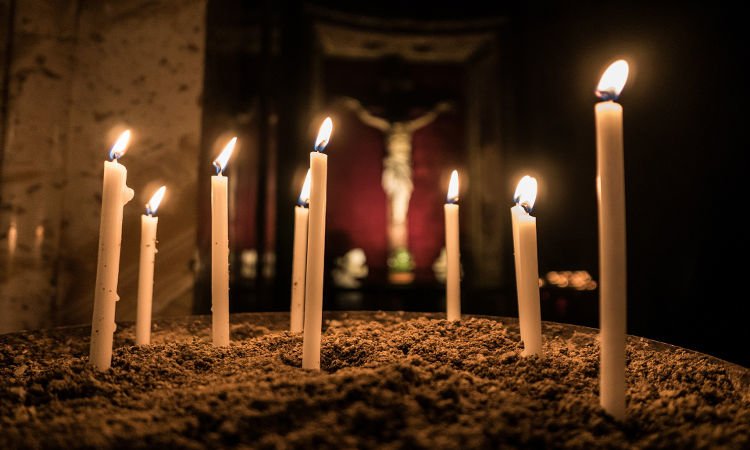
Every day we read during matins about the lives of the saints (the synaxaria), their devotion to Christ even until death, the miracles that they performed through their prayers and their remarkable ascetic feats – some lived on pillars and others in deserts. Indeed many of them form an impression that the saints were not ordinary people like us. Many think that those saints who had the courage to face the beasts that were released to devour them with joy or those who kept the peace of their souls even during the harshest trials and tribulations lived in monasteries and hermitages and not in societies like us!
But if only certain individuals were destined to become saints, then how could God exhort us all to "be holy as I am a holy" (1. Peter 1;16)? God indeed created us to become saints. Holiness is the very purpose of our lives. Holiness is not something reserved to only to some champions of the faith, who were as if imbued with supernatural powers. The saints were like us! Some of them even found themselves in more difficult situations than us: in sickness, poverty, affliction, accused, slandered, exiled and wronged.
There is no doubt that each of us, by the Grace of God and by our own effort, can become saints. After all, all of us who are baptized Christians, by participating in the life of the Holy Church, entered the path to holiness. We can only continue this path with fidelity. That is why in every divine Liturgy we implore the Lord to ”sanctify our souls and bodies, and to grant that we may worship You in holiness all the days of our lives" (The Prayer of the Trisagion Hymn).
The hagiologies (lives of the saints) of the Church show that every Christian, no matter what social class he belongs to, no matter how gravely he has sinned, if he sincerely wishes to, he can become a saint. Let us remember the innumerable examples of immoral people, criminals, robbers, etc., who through their sincere repentance were purified and are now honored as Saints in the Church.
But what are the characteristics of holiness?
- The saint loves Christ; longs for communion with Him; follows in his footsteps freely until the very end as he effortlessly, willingly and joyfully strives to overcome the obstacles that may interrupt his fellowship with Christ.
- The saint, at the same time, loves his fellow human beings, as images of God, and takes care in every way to show his love to them in practice. The saint acquires the mind of Christ and is inspired in his life by the Holy Spirit, who is the source of his sanctification.
-The saint loves humility and meekness. The saint conquers pride, ambition, egoistical thinking and the selfish powers of his soul.
-The saint lives with constant repentance and considers himself (like the Apostle Paul) the first of sinners, therefore he does not criticize or judge anyone.
-The saint patiently faces illnesses, slanders, injustices, persecutions, and every deprivation, because he entrusts his life to the Man-Loving Lord Jesus Christ.
- If in exceptional circumstances, due to external reasons that are independent from his will, he would be deprived of the basic spiritual nourishment, such as the Divine Liturgy and Divine Communion, he does not fall into depression and despair. He seeks continuously, with confidence in the Almighty Lord, to fulfill, in the ways he knows, his spiritual needs. An excellent example in this matter is St. Theoktiste of Methymna.
St. Theoktiste lived about 1200 years ago. From the age of 20 she became a nun in a monastery outside Methymna on the island of Lesbos. In those times pirates dominated the Aegean and the Mediterranean Seas. Some islands had been deserted by their frequent raids. One night the pirates attacked the area of Methymna and, among others, arrested the Nun Theoktiste in order to sell them as slaves in the slave markets of Egypt. When the pirate ship arrived on the island of Paros, which was already deserted, the nun Theoktiste after praying to the Virgin Mary found a way to escape the pirates' attention and disappear into the forest. The pirates left and the nun remained completely isolated for 35 years on the desert island. Being homeless, she took refuge in the historic church of Ekatontapyliani on the island of Paros, which has survived until this day. Now how did she live? It is difficult to imagine. However, what she lacked most was the Divine Liturgy and the Divine Eucharist. According to divine providence she was to commune only once at the end of her life, just before she closed her eyes. All these deprivations did not prevent her from reaching holiness, or from being celebrated as a saint!
How hard it is for the Orthodox Christian to be deprived of the Divine Liturgy and the Eucharist, still millions of Orthodox Christians have recently experienced the same due to the coronavirus pandemic! But let us think of St. Theoktiste, who suffered from the same deprivation, yt being a nun, for 35 years! Nevertheless, she became a Saint.
Therefore no external obstacle can stop our path to holiness if we decide to live in fellowship with Christ for the rest of our lives.
And let us end, my brothers an sister, with the words of St. Basil: "Holiness is to dedicate ourselves completely to God and continuously and at every time to take care of and seek for that which pleases Him." Amen.





